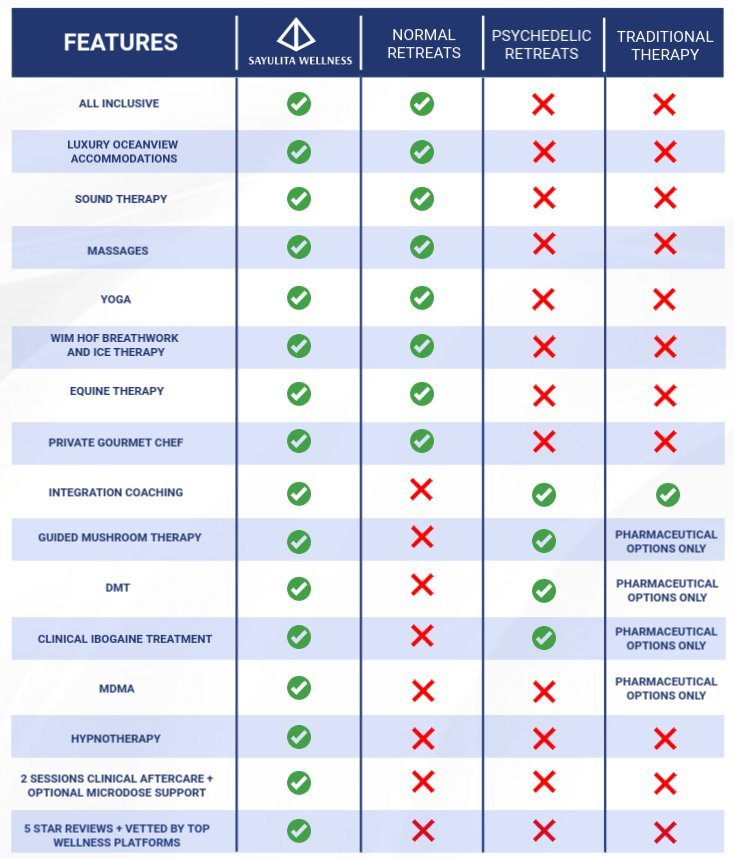Psychedelic Plant Medicine Retreat In Paradise
“A Re-Birth” into your own happiness, sense of self, and inner peace with the #1 psilocybin mushroom therapy retreat in Mexico
As Featured On




Why Sayulita Wellness Retreat
Our guided psilocybin retreat is designed to improve the physical, chemical, mental, emotional and nutritional factors involved in stress relief, relaxation, releasing fears, healing trauma, and seeing life from insightful and exciting new perspectives.
Our Psilocybin Retreat combines science and spirituality by merging practical and proven methods of psychotherapy, counseling and medical support with the traditional wisdom passed down by the shaman of medicine tribes.
Our multi-modal program focuses on merging 11 scientifically proven processes with psilocybin therapy to ensure our guests have profound realizations and breakthroughs in a safe and controlled environment.
Our leadership team at our wellness retreat in Mexico consists of Charly and Nirvana, both hailing from Tabasco, Mexico from families that have provided ceremony and medicine practices for generations. As well as Keeley and Pedro our expert psychotherapists that lead the program and provide counseling and integration.
Our total staff of 15 professionals have provided over 10,107 successful psychedelic treatments and have helped patients overcome problems such as addiction, depression, anxiety, stress, overwhelm, and fatigue.
Luxury Oceanfront Retreat Center
Our center is a safe and luxurious environment to experience healing with a private beach, private rooftop pool, and exclusive penthouse rooms with a spa and gym on-site. We have a loving and supportive team to help guide you through every step of the journey and create the experience of a lifetime.
What Makes Our Retreat Different:

Who Is This Psychedelic Retreat For?

This psilocybin retreat is a good fit for you if…
- You want to destress and re-energize
- Are looking for a greater purpose or clarity
- Want to enhance their drive, motivation, and creativity
- Are ready to wake up feeling happy and ready to face the day
- Want to improve the physiological and psychological factors that increase performance and focus
- Connect with a deeper sense of self and well-being at our psilocybin retreat
- Overcome addiction to alcohol, nicotine, sleeping medication, or antidepressants and find a deep sense of inner peace
- Put symptoms of trauma, PTSD, anxiety, and depression in the past and live a meaningful life
Check Out Our 5 Star Google Reviews:
All Inclusive Retreat Packages
Platinum 7-Day Psilocybin Private Retreat
- 1-1 Private Psilocybin Therapy in Supervised Controlled Setting
- Full evaluation by Doctor and Nurse Supervision
- Gourmet Anti-Inflammatory Meals
- Luxury Private Accommodations
- Intention Setting Ceremony
- Jungle Horseback Riding
- Hypnotherapy
- Deep Tissue Massage
- 1-1 Integration With Psychologist
- Relaxation Massage
- Yoga
Platinum 7-Day Psilocybin Private Retreat
Couples Psilocybin Retreat
- Private Psilocybin Macro Dose Therapy 3.5-7g
- Private MDMA Relationship Healing Therapy (100-200mg)
- 2x Psilocybin Micro Dose (200-800mg)
- Full Evaluation by Staff Medical Team
- Anti-Inflammatory Private Chef Prepared Vegan and Pescatarian Meals
- Private Ocean View Suite with Private Bath
- Hypnotherapy
- 3x Healing Relaxation Massages
- 3x Yoga and Somatic Movement Classes
- Luxury Sunset Sailing Through Bay of Banderas
- Rhythms Of The Night #1 Dinner Show
- 90 Day Micro Dose After Retreat Support Program
Couples Psilocybin Retreat
Ibogaine Retreat
- 1-1 Ibogaine treatment in therapeutic medical facility onsite
- Private room at penthouse
- EKG’s onsite
- Full evaluation by Doctor and Nurse Supervision
- Gourmet Anti-Inflammatory Meals
- Luxury Private Accommodations
- Hypnotherapy
- Deep Tissue Massage
- 1-1 Integration With Psychologist
- Relaxation Massage
- Yoga and Somatic movement
Ibogaine Retreat
4-Day Psilocybin Retreat
- Private 1-1 Macro Dose Psilocybin Therapy in Supervised Controlled Setting
- Two Micro Dose Psilocybin Experiences
- One DMT Therapy Breakthrough Session
- Full evaluation by Doctor and Nurse Supervision
- Gourmet Anti-Inflammatory Meals by Team of Private Chefs
- Luxury Private Oceanfront Penthouse Accommodations
- Intention Setting Ceremony
- Jungle Horseback Riding
- 4 Weeks 1-1 After Care with Psychotherapist
- 90 Day Micro Dose After Retreat Support Program
- Hypnotherapy
- Deep Tissue Massage
- 1-1 Integration With Psychologist
- Relaxation Massage
- Yoga
4-Day Psilocybin Retreat
7-Day Psilocybin Retreat
- Two Private 1-1 Macro Dose Psilocybin Therapy in Supervised Controlled Setting
- Two Micro Dose Psilocybin Experiences
- Two DMT Therapy Breakthrough Sessions
- Full evaluation by Doctor and Nurse Supervision
- Gourmet Anti-Inflammatory Meals
- Luxury Private Oceanfront Penthouse Accommodations
- Intention Setting Ceremony
- Private Snorkel Tour
- Jungle Horseback Riding
- 4 Weeks 1-1 After Care with Psychotherapist
- 90 Day Micro Dose After Retreat Support Program
- Hypnotherapy
- Deep Tissue Massages
- Relaxation Massage
7-Day Psilocybin Retreat
Platinum 7-Day Psilocybin Private Retreat
- 1-1 Private Psilocybin Therapy in Supervised Controlled Setting
- Full evaluation by Doctor and Nurse Supervision
- Gourmet Anti-Inflammatory Meals
- Luxury Private Accommodations
- Intention Setting Ceremony
- Jungle Horseback Riding
- Hypnotherapy
- Deep Tissue Massage
- 1-1 Integration With Psychologist
- Relaxation Massage
- Yoga
Platinum 7-Day Psilocybin Private Retreat
Couples Psilocybin Retreat
- Private Psilocybin Macro Dose Therapy 3.5-7g
- Private MDMA Relationship Healing Therapy (100-200mg)
- 2x Psilocybin Micro Dose (200-800mg)
- Full Evaluation by Staff Medical Team
- Anti-Inflammatory Private Chef Prepared Vegan and Pescatarian Meals
- Private Ocean View Suite with Private Bath
- Hypnotherapy
- 3x Healing Relaxation Massages
- 3x Yoga and Somatic Movement Classes
- Luxury Sunset Sailing Through Bay of Banderas
- Rhythms Of The Night #1 Dinner Show
- 90 Day Micro Dose After Retreat Support Program
Couples Psilocybin Retreat
Ibogaine Retreat
- 1-1 Ibogaine treatment in therapeutic medical facility onsite
- Private room at penthouse
- EKG’s onsite
- Full evaluation by Doctor and Nurse Supervision
- Gourmet Anti-Inflammatory Meals
- Luxury Private Accommodations
- Hypnotherapy
- Deep Tissue Massage
- 1-1 Integration With Psychologist
- Relaxation Massage
- Yoga and Somatic movement
Ibogaine Retreat
4-Day Psilocybin Retreat
- Private 1-1 Macro Dose Psilocybin Therapy in Supervised Controlled Setting
- Two Micro Dose Psilocybin Experiences
- One DMT Therapy Breakthrough Session
- Full evaluation by Doctor and Nurse Supervision
- Gourmet Anti-Inflammatory Meals by Team of Private Chefs
- Luxury Private Oceanfront Penthouse Accommodations
- Intention Setting Ceremony
- Jungle Horseback Riding
- 4 Weeks 1-1 After Care with Psychotherapist
- 90 Day Micro Dose After Retreat Support Program
- Hypnotherapy
- Deep Tissue Massage
- 1-1 Integration With Psychologist
- Relaxation Massage
- Yoga
4-Day Psilocybin Retreat
7-Day Psilocybin Retreat
- Two Private 1-1 Macro Dose Psilocybin Therapy in Supervised Controlled Setting
- Two Micro Dose Psilocybin Experiences
- Two DMT Therapy Breakthrough Sessions
- Full evaluation by Doctor and Nurse Supervision
- Gourmet Anti-Inflammatory Meals
- Luxury Private Oceanfront Penthouse Accommodations
- Intention Setting Ceremony
- Private Snorkel Tour
- Jungle Horseback Riding
- 4 Weeks 1-1 After Care with Psychotherapist
- 90 Day Micro Dose After Retreat Support Program
- Hypnotherapy
- Deep Tissue Massages
- Relaxation Massage
7-Day Psilocybin Retreat
Platinum 7-Day Psilocybin Private Retreat
- 1-1 Private Psilocybin Therapy in Supervised Controlled Setting
- Full evaluation by Doctor and Nurse Supervision
- Gourmet Anti-Inflammatory Meals
- Luxury Private Accommodations
- Intention Setting Ceremony
- Jungle Horseback Riding
- Hypnotherapy
- Deep Tissue Massage
- 1-1 Integration With Psychologist
- Relaxation Massage
- Yoga
Platinum 7-Day Psilocybin Private Retreat
Psilocybin Shamanic Experiences
1-Day Traditional Psilocybin Shamanic Experience
Group Sizes: Up to 6
- 30-Day Preparation Course
- Air Port Pick Up & Drop Off (Purchased Separately)
- Relaxing Yoga
- Gated Community
- Chef Prepared Meals
- Double Occupancy Rooms – 1 Night
- Group Psilocybin Ceremony – 1 Macro-dose
- Onsite Meditation
- Assisted Video Therapy
3-Day Psilocybin Shamanic Experience
Group Sizes: Up to 8
- 30-Day Preparation Course
- Air Port Pick Up & Drop Off
- Relaxing Yoga
- Opening Ceremony
- Gated Community
- Chef Prepared Meals
- Double Occupancy Rooms – 2 Nights
- Group Psilocybin Ceremony – 1 Macro-dose & 1 Micro-does
- Onsite Meditation
- Assisted Video Therapy
About Psilocybin
Our Psilocybin is carefully curated to facilitate a deep connection with your inner self. Its properties are known to enhance mental clarity, emotional balance, and spiritual awakening, creating an environment conducive to personal growth and healing.
What Our Delighted Guests Have To Say
Josh 44 - Business Owner, AR
Josh struggled with 44 years of PTSD and treatment resistant depression. He tried every Rx medication and traditional treatment option before coming down. During his 4 day experience he was able to let go of his difficult past and find a deep sense of peace. In his words he “found the beauty inside himself and in his life again”
Helena 54 - Detroit MI
”I got more healing in 8 days at Sayulita Wellness than 25 years of pharmaceuticals..it’s the best decision I’ve made in my entire life” Helena was able to get off her Rx medication and get back to a productive and enjoyable life. She was able to resume work, get clarity on her next steps and wake up feeling happy again after a lifetime of anxiety and depression.
Brandon 49 - CFO - Denver, CO
Brandon is a veteran that came to the retreat after losing his son in 2019. He also had recently separated in his marriage and was having suicidal ideation. At the retreat he was able to say goodbye to his son and move forward in his life. After the retreat he’s started dating, traveled to Vegas, sold 2 investment properties, vacationed in Mexico, explored Colorado in his 4Runner, lost 35 lbs and finished at #2 in a crossfit competition.
Feature One
Thomas was looking for a big reset in his life. He had a breakthrough in his psilocybin session and found a renewed sense of purpose. He’s since gone back home and committed to taking action to be more connected to his family, spend time in nature and keep growing spiritually with a journaling and meditation practice.
Feature One
Beth came to this retreat to support her husband, but ultimately realized the experience was for her as well. She had breakthroughs with our providers and reconnected with her inner child, healed past emotions, and began journaling. Since the retreat she has taken her fresh perspective back home and is enjoying traveling the world with Alfred.
Feature One
Cate came to a 4 day retreat because she was stuck in her business and wanted to move forward. After an incredible psilocybin experience she says she “Gets It” and went back home to expand her brand into multiple salons and launched a grand opening party for her product line.
Julie 60 - CFO - Chicago, IL
Julie came to the retreat wanting to break free from 20 years of sleeping medication use. After a breakthrough with our providers, she’s successfully stayed off sleeping meds, stopped eating meat, reduced alcohol and committed to losing 20 lbs. She’s also focused on taking the next steps in her career by interviewing for board positions.
Alfred 74 - Retired Coach - Las Vegas, NV
Alfred came to the retreat to quit drinking alcohol. After having a breakthrough psilocybin experience he has been living life fully and alcohol free with his wife traveling through South America.
John - Napa Valley, CA
John came to find a deeper meaning and purpose in his life. After his guided psilocybin experience he went back home committed to reconnect with his daughter and live his life for himself. He’s since traveled to Italy for a car show which he’s passionate about, has been eating healthy, and hasn’t drank alcohol since his retreat.
Recent Wellness Retreat Experiences
[Intention: Overcome anxiety, depression, PTSD]
“Coming to Sayulita Wellness Retreat was a major leap of faith for me because I was very skeptical and distrustful about this alternative therapy model; but I knew I needed help! I am very successful professionally but I had lots of anxiety & depression in my life and I was stuck in my head.
I had been researching plant medicine assisted-therapy centers all over -Amsterdam, Jamaica, Mexico and the USA; but none seemed right. I had found another center in Sayulita, Mexico; and even attended a zoom call which was great, but something did not feel right.
Somehow, I kept coming back to SWC so, one night before I went to bed, I reached out. To my surprise, I got a text within 5 minutes! I was stunned but very anxious, so I deferred to the next day. When I spoke with Andrew the next day, I made it known that trust was fundamental to me and that it all seemed too good to be true! He was very patient and put me at ease right away by answering all of my questions very calmly. He even connected me with other alumni clients. I waited a few days and devoured all the information on their web site. Although my mind was giving me all kinds of warnings, SWC felt right! So, I took the plunge and I booked myself for the next retreat.
Wow! This was the best gift I have ever given to myself! I have undergone a fundamental shift of mindset & attitude and set on a journey of self-discovery & joy. Truly transformational!
SWC is truly unique! The holistic program helped me gradually condition my mind, body & soul to undergo this mystical spiritual experience. The camaraderie, love, sharing and 1:1 session with Andrew opened my mind and eased my anxiety; the nutrition, exercise, yoga and massage therapy plus beautiful ocean conditioned my body for the ceremonies. The magical plant medicines together with the love, care, guidance and mystical connection I experienced with Nirvana & Charly before, during and after the ceremonies were transcendental.
I am forever grateful to Andrew, Nirvana, Charly, our amazing Chef -Omar, our talented yoga instructor – Nikki, our magical hypnotherapist -Andrea and our wise sound therapist -Victor for this gift of life. I have tapped into an everlasting source of energy & love that has launched me into another dimension of living. I can’t wait to go back soon!”
[Intention: Overcome PTSD, depression, and anxiety]
Here is a review from a review skeptic:
RUN!! Do not walk, run TO a Sayulita Wellness Center retreat as fast as you can.
My life, my heart and my soul are forever changed, happier, and healthier as a result.
I cannot adequately express how loved, cared for, supported, informed and healed I felt before, during, and still after by this amazing group of people. Their hearts are bigger than life. Their desire and passion to serve, heal and nurture was like nothing I have ever experienced. True service above self. The joy they emanate and the joy they purposefully share is palpable and contagious. Their willingness to open their hearts to heal me and our whole group was unexpected and shocking, in the best ways. I will forever be in gratitude for each and every one of them.
Denis and Norma are angels. They cooked us delicious meals that paired perfectly with our activities and needs. They loved all over us, every minute, every day. They made us presents!, made sure to make delicious cakes to celebrate one of our birthdays, and constantly looked for ways to make our experience more comfortable and wonderful. During the psilocybin ceremony they tended to each of our needs and made sure we knew we were loved and safe. It was incredible how they were always close by and looking to help. I cannot say enough about how amazing Denis and Norma are.
Keeley and Pedro, the psychotherapists, did more for me in the 2 sessions that I had separately with each of them (4 total in 8 days) than I accomplished in decades of on/off therapy. I could not articulate what I wanted out of this experience, except that I wanted to be free of depression and anxiety, feel whole and be able to share the outrageous amounts of love in my heart. They helped me get to the root of my challenges and what was in the way. They helped me set intentions for the ceremony so I could process and let go of my pain, that I had been holding in my heart for 50 years, so I could let the love in and out. It was life changing. Even after the retreat, they continue to support me to keep building and integrating my new, beautiful life going forward. They are so different from one another and they compliment each other so well. I felt heard for the first time in my life. They each saw me, my heart, my traumas, and wanted to truly help me feel whole. They are incredible.
Nirvana and Charly are true healers. They are love. They are givers. They are everything. They changed my life by showing me that giving all you have to others, even strangers initially, is the only way to live. Their willingness to share their: Lives, culture, knowledge, gifts, challenges, and successes was so genuine. They gave us the relationships they built with others who cared for us and served us so beautifully. They changed my life in every possible positive way.
From the first moment I signed up to this second now writing this review, they are with you in person and spirit. Always available and ready to help you on your journey.
Do it!! Surrender to it all!
You will be so glad you did!
Namaste
[Intention: Find self love, acceptance, and direction]
Man it was the best experience of my life. To say it was amazing would be an understatement. It was life changing, it was exactly what I needed at that exact point in my life. It has showed me a way and I feel determined to follow it. I was lost and now I am found. This experience really helped my vision of what I want my life to be like. Happy and full of love and forgiveness! Truly grateful for everyone involved.
I would love to return one day for another journey! Loved every minute of it!! Thank you so so so much!
[Intention: Get back in control of my life, heal bipolar disorder, fatigue, depression, and anxiety]
“Before taking the program things were pretty bad like one of the lowest points in my life, as a successful as i’ve been in business my mental health gone. I was not having energy, having headaches all the time, having a hard time managing my stress and emotions.
After the experience I have a lot more peace and calm in my personal life and just feel happier overall. The program primes you to you understand yourself and make better decisions based off your core values.
It’s one of the best investments i’ve ever made.It’s kept me stabilized, focused and clear on my goals in life.
If you’re considering it I would say just go ahead and invest in yourself now”
[Intention: Overcome treatment resistant depression]
“First off I have to say I’m a natural sceptic…but I’ve kind of thrown the kitchen sink at my mental health…therapy, meds, disassociation, alcohol. I was at a point where I had done everything I could think to do. I believe this is the point when you should try plant medicine.
The onboarding was great..everyone felt really warm and supportive. I’m always kind of worried I won’t fit in.
We had a lot of opportunities to learn about the medicine and unpacked a lot with the guides before the ceremony. I honestly think I got just as much from the 1-1 and group training as I did with the medicine. The mushrooms were pretty eye opening…I saw my path laid in front of me, confronted relationships with my family and relationships from my past. Some of it was difficult but I felt really connected to myself so it just kind of melted. After the mushroom the Bufu took me to the next level. I honestly wasn’t expecting much from it.. I was there mainly for the mushroom ceremony, but Jesus Christ…I have never felt so alive..I experienced what I would call a transcendent awakening..where I saw the pieces of myself come back together. It was really special. I feel forever grateful for the practitioners for holding a safe and supportive space.. they were really easy to talk to and accessible when I needed them. Overall and my mental health is at one the best places its been and I thank Sayulita Wellness Retreat for this. 5/5 stars…I will be back.”
[Intention: Overcome anxiety, depression, PTSD]
“Coming to Sayulita Wellness Retreat was a major leap of faith for me because I was very skeptical and distrustful about this alternative therapy model; but I knew I needed help! I am very successful professionally but I had lots of anxiety & depression in my life and I was stuck in my head.
I had been researching plant medicine assisted-therapy centers all over -Amsterdam, Jamaica, Mexico and the USA; but none seemed right. I had found another center in Sayulita, Mexico; and even attended a zoom call which was great, but something did not feel right.
Somehow, I kept coming back to SWC so, one night before I went to bed, I reached out. To my surprise, I got a text within 5 minutes! I was stunned but very anxious, so I deferred to the next day. When I spoke with Andrew the next day, I made it known that trust was fundamental to me and that it all seemed too good to be true! He was very patient and put me at ease right away by answering all of my questions very calmly. He even connected me with other alumni clients. I waited a few days and devoured all the information on their web site. Although my mind was giving me all kinds of warnings, SWC felt right! So, I took the plunge and I booked myself for the next retreat.
Wow! This was the best gift I have ever given to myself! I have undergone a fundamental shift of mindset & attitude and set on a journey of self-discovery & joy. Truly transformational!
SWC is truly unique! The holistic program helped me gradually condition my mind, body & soul to undergo this mystical spiritual experience. The camaraderie, love, sharing and 1:1 session with Andrew opened my mind and eased my anxiety; the nutrition, exercise, yoga and massage therapy plus beautiful ocean conditioned my body for the ceremonies. The magical plant medicines together with the love, care, guidance and mystical connection I experienced with Nirvana & Charly before, during and after the ceremonies were transcendental.
I am forever grateful to Andrew, Nirvana, Charly, our amazing Chef -Omar, our talented yoga instructor – Nikki, our magical hypnotherapist -Andrea and our wise sound therapist -Victor for this gift of life. I have tapped into an everlasting source of energy & love that has launched me into another dimension of living. I can’t wait to go back soon!”
[Intention: Overcome PTSD, depression, and anxiety]
Here is a review from a review skeptic:
RUN!! Do not walk, run TO a Sayulita Wellness Center retreat as fast as you can.
My life, my heart and my soul are forever changed, happier, and healthier as a result.
I cannot adequately express how loved, cared for, supported, informed and healed I felt before, during, and still after by this amazing group of people. Their hearts are bigger than life. Their desire and passion to serve, heal and nurture was like nothing I have ever experienced. True service above self. The joy they emanate and the joy they purposefully share is palpable and contagious. Their willingness to open their hearts to heal me and our whole group was unexpected and shocking, in the best ways. I will forever be in gratitude for each and every one of them.
Denis and Norma are angels. They cooked us delicious meals that paired perfectly with our activities and needs. They loved all over us, every minute, every day. They made us presents!, made sure to make delicious cakes to celebrate one of our birthdays, and constantly looked for ways to make our experience more comfortable and wonderful. During the psilocybin ceremony they tended to each of our needs and made sure we knew we were loved and safe. It was incredible how they were always close by and looking to help. I cannot say enough about how amazing Denis and Norma are.
Keeley and Pedro, the psychotherapists, did more for me in the 2 sessions that I had separately with each of them (4 total in 8 days) than I accomplished in decades of on/off therapy. I could not articulate what I wanted out of this experience, except that I wanted to be free of depression and anxiety, feel whole and be able to share the outrageous amounts of love in my heart. They helped me get to the root of my challenges and what was in the way. They helped me set intentions for the ceremony so I could process and let go of my pain, that I had been holding in my heart for 50 years, so I could let the love in and out. It was life changing. Even after the retreat, they continue to support me to keep building and integrating my new, beautiful life going forward. They are so different from one another and they compliment each other so well. I felt heard for the first time in my life. They each saw me, my heart, my traumas, and wanted to truly help me feel whole. They are incredible.
Nirvana and Charly are true healers. They are love. They are givers. They are everything. They changed my life by showing me that giving all you have to others, even strangers initially, is the only way to live. Their willingness to share their: Lives, culture, knowledge, gifts, challenges, and successes was so genuine. They gave us the relationships they built with others who cared for us and served us so beautifully. They changed my life in every possible positive way.
From the first moment I signed up to this second now writing this review, they are with you in person and spirit. Always available and ready to help you on your journey.
Do it!! Surrender to it all!
You will be so glad you did!
Namaste
About Psilocybin Therapy
Your journey with Psilocybin is guided by experienced professionals who ensure a safe, supportive, and nurturing environment. We believe in the power of this natural wonder to unlock new perspectives and enrich your life journey.
Personalized Care for Your Psilocybin Journey
Upon arrival, each guest engages in a personalized consultation with our experienced providers. This session is tailored to ensure that the treatment aligns perfectly with your unique needs. We consider several factors, including your body composition, personal tolerance levels, and the depth of the experience you seek, to determine the most suitable approach for your transformative journey.
Our Thoughtful Preparation Method
The key component of our treatment is meticulously prepared for optimal effectiveness. The Psilocybin we use is locally sourced and prepared using century old traditional ceremonial methods, ensuring its quality and safety for a profound participant experience. It's finely ground and precisely measured to ensure consistency. This preparation is then combined with a natural citrus enhancer, renowned for its ability to facilitate a smooth and balanced experience. This method ensures fast and even uptake, setting the stage for a profound and harmonious journey.
Extension for Deeper Exploration
During your experience, should you wish to deepen or extend your journey, our providers can offer an additional measure. This option is available upon request, providing flexibility to adjust the intensity and duration of your experience, ensuring it aligns with your personal comfort and exploration goals.
Team Members
Charly & Nirvana
Charlie and Nirvana were both born in Mexican tribes and raised in the US. Charlie built a successful real estate business out of California, has raised 3 beautiful children and is now married to the wonderful Nirvana. Nirvana introduced him to plant medicine where he re-discovered his spirituality.
Nirvana spent much of her adult life as a corporate exec later returning to her roots in Mexico to become a healer, spiritual guide, and yoga instructor.
Both began teaching at retreats 10 years ago and have over 4,000 successful clients. The two together hold an eternity of wisdom within their hearts.
Dr Martha Palomera
Dr. Palomera is an esteemed and accomplished clinical psychologist with a wealth of experience in the field. With a deep passion for understanding and assisting individuals in their mental and emotional well-being, Dr. Palomera has dedicated their career to helping patients navigate the complexities of the human mind.
Having earned a doctoral degree in clinical psychology from University in Guadalajara, Mexico. Dr. Palomera possesses a strong academic foundation complemented by extensive practical training. She has honed her skills through years of hands-on work with diverse populations, gaining invaluable insights into the intricacies of human behavior and the challenges people face in their daily lives.
Dr. Palomera’s approach to therapy is characterized by empathy, compassion, and a genuine desire to make a positive impact on their patients’ lives. She employs evidence-based techniques and tailored treatment plans to meet the unique needs and goals of each individual. Dr. Palomera firmly believes in fostering a safe and trusting therapeutic environment, where clients feel comfortable sharing their concerns and working towards growth and healing.
Throughout her career, Dr. Palomera has demonstrated expertise in various areas of clinical psychology, including anxiety disorders, mood disorders, trauma-related conditions, and interpersonal difficulties. They have helped numerous individuals overcome obstacles, develop coping strategies, and achieve personal growth. Dr. Palomera’s dedication to her patients’ well-being is evident in their commitment to staying abreast of the latest research and advancements in the field.
Dr. Palomera is passionate about raising awareness about mental health and reducing the stigma surrounding it. Her reputation as a compassionate and highly skilled clinician precedes her, earning her the respect and trust of both colleagues and patients alike. Her unwavering commitment to providing the highest quality care makes her a sought-after professional in the field of clinical psychology.
Margarita Ayón
Margarita Ayón Ruiz Velazco is a biologist from the University of Guadalajara and holds a master’s in Neuro-Linguistic Programming from the Yolistli Institute. She has extensive training in Resonance Repatterning of Unconscious Patterns, Family and Fluvial Constellations, Gnostic Psychology, Meditation, Akashic Records, and Hebrew Pendulum practices. Margarita has also completed workshops in Relationship Management using Gestalt techniques and a course in Psychotherapy incorporating psychedelics.
A psychotherapist for over a decade, Margarita has been teaching meditation and self-knowledge since 2019. She is a dancer with the Moondance Malinalli Meztli in Tepic, Nayarit, where she studies ancient Mexican traditions to empower women’s spiritual development.
Margarita’s psychedelic journey began in 2015 with Yopo at the Fire of Bailadores in Mexico. She later expanded her experience with Ayahuasca, Yagé, and Mushrooms and apprenticed in the use of Bufo alvarius with Mama Galia in Punta Chueca, Sonora.
Nikky Lila
Nikky is a Somatic Healing Guide, Breathwork Facilitator, and 300 hour RYT of Hatha Vinyasa. Years of training and devoted practice have led her to connect with her mission of helping others awaken to their unique gifts and next step in their Soul’s evolution. Her teaching style blends Eastern traditions with Western science to create a balanced learning environment. Nikky holds a sacred container for each of her sessions, she guides the energy of a class with a clear intention and shares her knowledge of the ancient sciences and spiritual practices in an accessible and digestible way, but most importantly she transmits wisdom through her own personal embodiment.
Victor
Victor is our Sound and Water Therapy facilitator. He uses different instruments with frequencies allow you to reduce anxiety and stress levels, improve sleep , provide physical, mental and emotional relaxation, facilitate deep meditative states, and improve focus and concentration.
He also provides water therapy which includes movements and stretching (by the therapist) performed in water, which allow reaching a state of meditation. Benefits include a deep physical, mental and emotional relaxation.
Andrew Tansil
Andrew joined the Sayulita Wellness Team January 2022 after a Psilocybin treatment with Charly and Nirvana. After suffering from anxiety for 6 years the treatment was a turning point. He had created success in business as a marketing consultant and also worked helping other entrepreneurs with mental health struggles.
Andrew instantly felt connected with the tribe and the love they shared with all their clients. Charly, Nirvana, and Andrew quickly became family and Andrew began helping with treatments as a provider. Pretty quickly it became apparent that there was synergy with the team.
Andrew wanted to offer the same transformation he found through his treatment and offered to help expand the vision and reach 1000’s more wonderful people here at Sayulita Wellness and came on board!
Juan Guillermo
Guillermo is our staff pharmacologist and does all our pre-screening to make sure everyone is in a healthy condition to go through the healing process.
Caileigh Feldman
Our growth-oriented Chief Experience Officer (CXO) excels in driving revenue through luxury retreat sales. With a wealth of experience in cultivating successful partnerships, expanding affiliate networks, and orchestrating luxury retreats globally, their keen attention to detail extends to directing impactful video content. As an organized, tech-savvy leader with a positive attitude, strong work ethic, and clear communication skills, they embody excellence in customer engagement.
Passionate about wellness, mindfulness, fitness, meditation, and healthy living, the CXO is committed to helping people unlock potential, broaden their consciousness, and optimize their health holistically.
Our Private Ocean View Facility
The center is in La Cuz – a beautiful secluded beach town in Nayarit, Mexico. Our wellness retreat offers accommodations with an ocean view penthouse overlooking the Pacific Ocean
Immersion in nature, daily sunshine and a distinct change in environment enhance the effectiveness of the program. The property is gated and secure.
All rooms at our healing retreat in Mexico are private and have air conditioning.
Access is very easy, we provide private secure drivers to pick you up and drop you off from the Puerto Vallarta Airport (PVR) included in your package. PVR is located 45 minutes from our psychedelic retreat facility and has flights from most major international cities.



Frequently Asked Questions
- $3,000 – 3 Days To Discover Yourself Experience
- $3,000 – 3-Day Couples All-Inclusive Group Retreat
- $4,997 – 4-Day All-Inclusive Retreat
- $5,997 – 4-Day Couples All-Inclusive Group Retreat
- $7,997 – 7-Day All-Inclusive Retreat
- $7,997 – 5- Day Ibogaine Retreat
- $8,997 – 7-Day Couples All-Inclusive Group Retreat
- $9,997 – 4-Day Couples All-Inclusive Private Retreat
- $11,997 – 7-Day Ibogaine Retreat
- $14,997 – 7-Day Couples All-Inclusive Private Retreat
- $14,997 – 7-Day All-Inclusive Platinum Retreat
You’ll want to book your flights to Puerto Vallarta Airport (PVR). Arrival time should be on the 1st day of the retreat. The best time to arrive is early afternoon. Check-in time is 2 pm, and it takes about 45 minutes to get from the airport to our facility. If you have an international flight that doesn’t have a convenient arrival time, we can still pick you up 24 hours early with our private drivers.
You’ll want to book departure flights on the last day of the retreat. Checkout is at 12:00 pm, and we schedule pickups at the airport about 4 hours before international flight departure to accommodate traffic or delays.
If you’d like to extend your stay or come early to Sayulita/Puerto Vallarta to experience the beauty the area has to offer, we can pick you up from your hotel or accommodations instead of the airport. Same with drop off on departure.
Please DO NOT book any flights or accommodations before completing your registration for your retreat dates. Spaces go fast!
Thanks to the last 40 years of tourism and the influx of expats purchasing homes and investment properties in the surrounding areas of Puerto Vallarta and Sayulita, this region of Mexico has become very safe. We have the highest-value real estate in all of Mexico. We’re a few miles from Four Seasons and other 5-star resorts, and Sayulita is known for being a great place to raise a family. With community development, such as libraries, private schools, and family-centered events, the community has become very safe with virtually no crime.
We also vet our drivers and team members to ensure that every step of your journey to and from our facility is safe and secure.
No, everything we offer is optional and designed to provide you with the best transformational experience possible. Our schedule is full of activities.
All rooms are private rooms with locks unless otherwise specified.
The 7-day and 4-day retreats have the same outcome: an incredible, safe, and profound transformation. We structured the 4-day retreat because many busy executives, lawyers, doctors, and business owners wanted to come to a retreat but didn’t have time in their schedule for a 7-day experience. If you look at our testimonials on the main page, about half of them came to a 4-day retreat!
































































